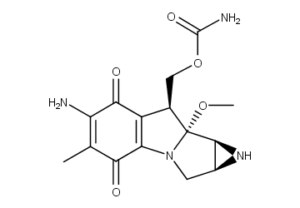Mitomycin CAS NO 50-07-7 Inquire about Mitomycin
Tecoland supplies Mitomycin bulk active pharmaceutical ingredient (API) to the pharmaceutical industry. Our Mitomycin is manufactured by cGMP compliant facility. Welcome to contact us for further details including current DMF status for the product and up to date regulatory status of the manufacturing facility. We look forward to assisting you with your research and development projects.
What is Mitomycin 
Mitomycin is used in combination with other cancer drugs to treat cancer of the stomach and pancreas.
Mitomycin may also be used for purposes not listed in this medication guide.
Warnings
Mitomycin can damage red blood cells, which may cause irreversible kidney failure. Tell your doctor right away if you have unusual bruising or bleeding, pale skin, confusion, tiredness or irritability, stomach pain, bloody diarrhea, red or pink urine, swelling, rapid weight gain, and little or no urinating.
Mitomycin can also weaken (suppress) your immune system, and you may get an infection more easily. Call your doctor if you have signs of infection (fever, weakness, cold or flu symptoms, skin sores, frequent or recurring illness).
Before taking this medicine
You should not be treated with mitomycin if you are allergic to it, or if you have:
- low levels of platelets in your blood;
- bone marrow suppression; or
- active bleeding or any risk of bleeding.
Tell your doctor if you have ever had:
- kidney disease;
- heart disease; or
- asthma, chronic obstructive pulmonary disease (COPD), sleep apnea, or other breathing disorder.
Mitomycin may harm an unborn baby. Use effective birth control to prevent pregnancy, and tell your doctor if you become pregnant.
You should not breastfeed while using mitomycin.
How is mitomycin given?
Mitomycin is given as an infusion into a vein. A healthcare provider will give you mitomycin.
Tell your caregivers if you feel any burning, pain, or swelling around the IV needle when mitomycin is injected.
Some people receiving mitomycin have developed ulcers on the skin where an injection was given, or on other areas of body. Skin changes may occur several weeks or months after a mitomycin injection. Call your doctor if you notice any redness, sores, oozing, or other skin changes during or after your treatment with mitomycin.
Mitomycin affects your immune system. You may get infections more easily. You will need frequent medical tests, and your next dose may be delayed based on the results.
Mitomycin can have long lasting effects on your body. You may also need medical tests for a short time after your last dose.
Mitomycin Side Effects
Get emergency medical help if you have signs of an allergic reaction: hives; difficult breathing; swelling of your face, lips, tongue, or throat.
Mitomycin can damage red blood cells, which may cause irreversible kidney failure. Tell your doctor right away if you have unusual bruising or bleeding, pale skin, confusion, tiredness or irritability, stomach pain, bloody diarrhea, red or pink urine, swelling, rapid weight gain, and little or no urinating.
Mitomycin may cause serious side effects. Call your doctor at once if you have:
- signs of infection (fever, weakness, cold or flu symptoms, skin sores, frequent or recurring illness);
- wheezing, chest tightness, new or worsening cough, trouble breathing;
- blisters or ulcers in your mouth, red or swollen gums, trouble swallowing; or
- pain, burning, redness, swelling, irritation, or skin changes where the injection was given.
Common side effects of mitomycin may include:
- fever or other signs of infection;
- nausea, vomiting, diarrhea, loss of appetite;
- mouth sores;
- drowsiness, headache;
- blurred vision; or
- temporary hair loss.
This is not a complete list of side effects and others may occur. Call your doctor for medical advice about side effects. You may report side effects to FDA at 1-800-FDA-1088.
Mitomycin dosing information
Usual Adult Dose for Stomach Cancer:
After full hematologic recovery from any previous chemotherapy: 20 mg/m2 IV at 6- to 8-week intervals
Comments:
- Because of cumulative myelosuppression, patients should be reevaluated after each course of this drug and the dose reduced if the patient has experienced toxicity.
- Doses greater than 20 mg/m2 have not been shown to be more effective and are more toxic than lower doses.
Uses:
- For disseminated adenocarcinoma of the stomach in proven combination with other approved chemotherapeutic agents or as palliative treatment when other modalities have failed
- For disseminated adenocarcinoma of the pancreas in proven combination with other approved chemotherapeutic agents or as palliative treatment when other modalities have failed
Drug Interactions
Other drugs may affect mitomycin, including prescription and over-the-counter medicines, vitamins, and herbal products. Tell your doctor about all your current medicines and any medicine you start or stop using.
Disclaimer:
Information on this page is provided for general information purposes. You should not make a clinical treatment decision based on information contained in this page without consulting other references including the package insert of the drug, textbooks and where relevant, expert opinion. We cannot be held responsible for any errors you make in administering drugs mentioned on this page, nor for use of any erroneous information contained on this page.